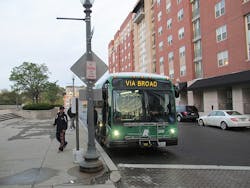Rhode Island Transit Authority orders Zero-emission Electric Buses and Depot Chargers
The Rhode Island Public Transit Authority has placed an order for 14 battery-electric, zero-emission Xcelsior CHARGE 40-foot heavy-duty transit buses and five ABB 50kWh depot chargers from NFI Group Inc.
The purchase was made through a Connecticut Department of Transportation contract. It is RIPTA’s first order of NFI zero-emission buses and infrastructure and will advance its green initiative.
The Xcelsior CHARGE™ bus can reduce as much as 100 to 160 tons of greenhouse gas emissions per year.
“RIPTA is counting on NFI's advanced mobility and infrastructure solutions to enable the transition to zero-emission at scale,” said Chris Stoddart, President, North American Bus and Coach. “Our battery-electric buses deliver immediate emissions reduction which helps fulfil RIPTA's commitment to sustainability. Together, we are reducing greenhouse gases, providing cleaner air, and working to create healthier communities.”
About the Author
EnergyTech Staff
Rod Walton is senior editor for EnergyTech.com. He has spent 17 years covering the energy industry as a newspaper and trade journalist.
Walton formerly was energy writer and business editor at the Tulsa World. Later, he spent six years covering the electricity power sector for Pennwell and Clarion Events. He joined Endeavor and EnergyTech in November 2021.
He can be reached at [email protected].
EnergyTech is focused on the mission critical and large-scale energy users and their sustainability and resiliency goals. These include the commercial and industrial sectors, as well as the military, universities, data centers and microgrids.
Many large-scale energy users such as Fortune 500 companies, and mission-critical users such as military bases, universities, healthcare facilities, public safety and data centers, shifting their energy priorities to reach net-zero carbon goals within the coming decades. These include plans for renewable energy power purchase agreements, but also on-site resiliency projects such as microgrids, combined heat and power, rooftop solar, energy storage, digitalization and building efficiency upgrades.
